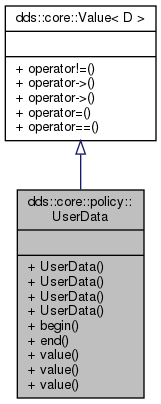 |
OpenSplice ISO C++ 2 DCPS
v7.x
ISO C++ 2 OpenSplice Data Distribution Service Data-Centric Publish-Subscribe API
|
 |
OpenSplice ISO C++ 2 DCPS
v7.x
ISO C++ 2 OpenSplice Data Distribution Service Data-Centric Publish-Subscribe API
|
#include "CorePolicy.hpp"

Public Member Functions | |
| UserData () | |
| UserData (const dds::core::ByteSeq &sequence) | |
| UserData (const uint8_t *value_begin, const uint8_t *value_end) | |
| UserData (const UserData &other) | |
| const uint8_t * | begin () const |
| const uint8_t * | end () const |
| bool | operator!= (const Value &other) const |
| D * | operator-> () |
| const D * | operator-> () const |
| bool | operator== (const Value &other) const |
| UserData & | value (const dds::core::ByteSeq &sequence) |
| template<typename OCTET_ITER > | |
| UserData & | value (OCTET_ITER begin, OCTET_ITER end) |
| const dds::core::ByteSeq | value () const |
This QosPolicy allows the application to attach additional information to a DomainParticipant, DataReader or DataWriter entity. This information is distributed with the BuiltinTopics.
| Value | Meaning | Concerns | RxO | Changeable |
|---|---|---|---|---|
| A sequence of octets: value | A sequence of octets that holds the application user data. By default, the sequence has length 0. | DomainParticipant, DataReader, DataWriter | No | Yes |
This QosPolicy allows the application to attach additional information to a DomainParticipant, DataReader or DataWriter entity. This information is distributed with the Builtin Topics. An application that discovers a new Entity ofthe listed kind, can use this information to add additional functionality. The UserDataQosPolicy is changeable and updates of the Builtin Topic instance must be expected. Note that the Data Distribution Service is not aware of the real structure of the user data (the Data Distribution System handles it as an opaque type) and that the application is responsible for correct mapping on structural types for the specific platform.
Definition at line 41 of file CorePolicy.hpp.
| dds::core::policy::UserData::UserData | ( | ) |
Creates a UserData QoS instance with an empty UserData
Definition at line 46 of file CorePolicyImpl.hpp.
|
explicit |
Creates a UserData QoS instance
| sequence | the sequence of octets |
Definition at line 49 of file CorePolicyImpl.hpp.
| dds::core::policy::UserData::UserData | ( | const uint8_t * | value_begin, |
| const uint8_t * | value_end | ||
| ) |
Creates a UserData QoS instance
| value_begin | a pointer to the beginning of a sequence of octets |
| value_end | a pointer to the end of a sequence of octets |
Definition at line 53 of file CorePolicyImpl.hpp.
| dds::core::policy::UserData::UserData | ( | const UserData & | other | ) |
Copies a UserData QoS instance
| other | the UserData QoS instance to copy |
Definition at line 59 of file CorePolicyImpl.hpp.
| const uint8_t * dds::core::policy::UserData::begin | ( | ) | const |
Gets a pointer to the first octet in the sequence
Definition at line 92 of file CorePolicyImpl.hpp.
| const uint8_t * dds::core::policy::UserData::end | ( | ) | const |
Gets a pointer to the last octet in the sequence
Definition at line 107 of file CorePolicyImpl.hpp.
|
inherited |
|
inherited |
The operator->() is provided to be able to directly invoke functions on the delegate.
The decision to provide direct access to the delegate was motivated by the need for providing a way that was not invasive with respect to the CXXDDS API and yet would allow for vendor-specific extension. Thus vendor-specific extensions can be invoked on the Value and on all its subclasses as follows:
|
inherited |
The operator->() is provided to be able to directly invoke functions on the delegate.
The decision to provide direct access to the delegate was motivated by the need for providing a way that was not invasive with respect to the CXXDDS API and yet would allow for vendor-specific extension. Thus vendor-specific extensions can be invoked on the Value and on all its subclasses as follows:
|
inherited |
| UserData & dds::core::policy::UserData::value | ( | const dds::core::ByteSeq & | sequence | ) |
Sets the sequence
| sequence | a sequence of octets |
Definition at line 62 of file CorePolicyImpl.hpp.
| UserData & dds::core::policy::UserData::value | ( | OCTET_ITER | begin, |
| OCTET_ITER | end | ||
| ) |
Sets the sequence
| begin | an iterator pointing to the beginning of a sequence of octets |
| end | an iterator pointing to the end of a sequence of octets |
Definition at line 71 of file CorePolicyImpl.hpp.
| const dds::core::ByteSeq dds::core::policy::UserData::value | ( | ) | const |